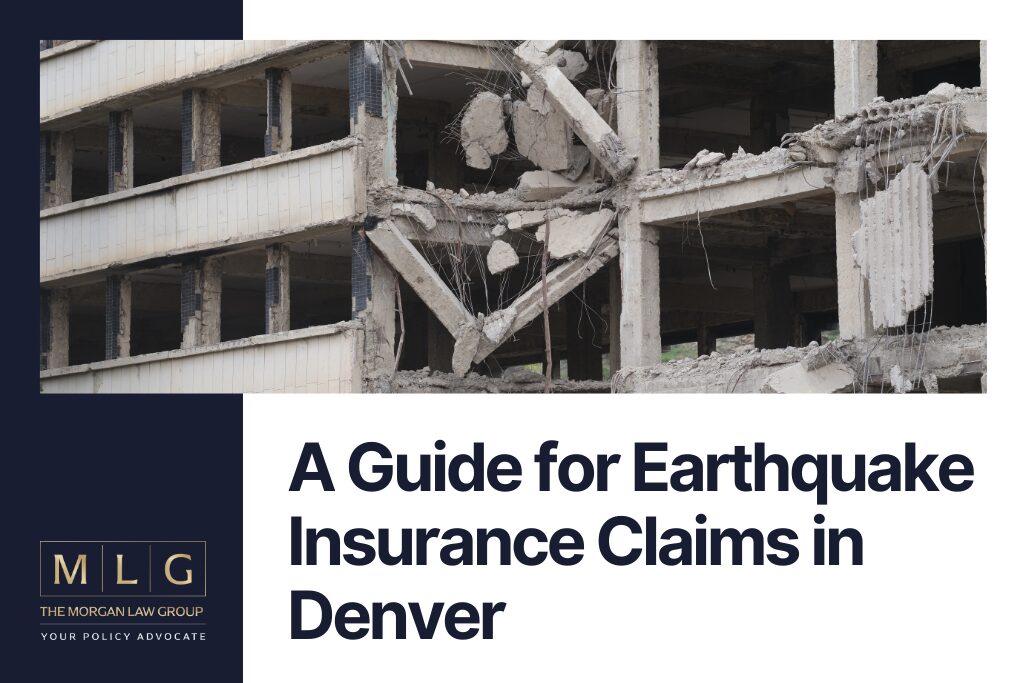Without proper coverage, the costs of repairs and rebuilding can be overwhelming, especially when standard homeowners’ policies do not cover earthquake damage in Denver. Such an unexpected disaster can be extensive, affecting the immediate ability to repair and rebuild.
Earthquake insurance is a critical safeguard for those in potentially affected areas. At The Morgan Law Group, our earthquake insurance claim attorneys in Denver specializes in representing clients dealing with earthquake damage, ensuring that their claims are handled with care and diligence.
What Earthquake Insurance Covers
Earthquake insurance is an essential safeguard for residents in Denver, providing financial protection against the damages caused by seismic events. This type of insurance is particularly important because standard homeowners’ policies do not typically cover earthquake damage.
- Repair or Replacement of Property: The primary function of earthquake insurance is to cover the costs associated with repairing or rebuilding your home after it has been damaged by an earthquake. This includes structural damages to the house itself, such as foundational cracks, collapsed walls, and other critical impairments that can compromise the safety and integrity of the structure.
In addition to the dwelling, earthquake insurance typically extends to other structures on your property, such as garages, sheds, and fences, which might also be affected by seismic activity. The extent of coverage for these auxiliary structures can vary, so it’s important to verify the specifics with your insurer.
- Personal Property Coverage: Beyond structural damage, earthquake insurance also covers personal property within the home. This includes furniture, electronics, appliances, and other belongings that could be damaged or destroyed by the force of the quake or related events, such as a fire or water damage following burst pipes. High-value items such as jewelry, art, and collectibles may require additional riders or endorsements to be fully covered, so reviewing your policy details is essential.
- Additional Living Expenses (ALE): If your home becomes uninhabitable due to earthquake damage, your earthquake insurance policy typically includes Additional Living Expenses (ALE). This coverage helps with the costs of living away from your home while it is being repaired or rebuilt.
ALE can cover hotel bills, rental homes, restaurant meals, and other necessary expenses incurred during your displacement. The coverage limits for ALE can vary widely, so it’s crucial to understand how much support your policy offers in these circumstances.
- Deductibles and Coverage Limits: One of the most critical aspects to understand about your earthquake insurance are the deductibles and coverage limits. Unlike typical insurance deductibles that are a flat dollar amount, earthquake insurance deductibles are usually a percentage of the policy’s coverage limit – ranging from 10% to 20%. This means if your home is insured for $300,000 and your deductible is 15%, you would be responsible for the first $45,000 of any earthquake damage.
Additionally, coverage limits – the maximum amount your insurer will pay for a covered loss – need to be sufficient to cover the cost of rebuilding your home and replacing your belongings at current market rates. Ensuring these limits are adequate can prevent significant out-of-pocket expenses after a disaster.
Purchasing earthquake insurance in Denver is a proactive step toward protecting your property and financial stability in the event of an earthquake. Given the potential variability in policy terms and the catastrophic nature of earthquake damages, thoroughly reviewing and understanding your policy’s coverage is indispensable.
How to File Earthquake Insurance Claim in Denver
Filing an earthquake insurance claim can seem overwhelming. Here’s how you can navigate through the process, ensuring that your rights are protected and your claims are properly addressed.
Step 1: Immediate Response
After ensuring everyone’s safety and the structural integrity of your property, it’s important to document all earthquake damage meticulously. Photograph and video evidence of the damages are vital for supporting your claim.
Step 2: Review Your Policy
Understanding the details of your earthquake insurance policy is key. Know what is covered, the extent of the coverage, and particularly how the deductible applies. Gathering financial records and other documents related to your property will also aid in substantiating your claim.
Step 3: Contact Your Insurance Provider
Promptly notify your insurance provider about the damage. We can assist in this initial step to ensure that all necessary details are correctly communicated, paving the way for a smoother claims process.
Step 4: Assessment and Adjustment
An insurance adjuster will inspect the damage. It’s advisable to have one of our earthquake damage claim attorneys in Denver present during this inspection to advocate on your behalf and ensure that all damage is accurately assessed.
Step 5: Resolving Your Claim
Once the assessment is complete, your insurer will present a settlement offer. Should this offer not meet your expectations or the real extent of your damages, we are prepared to negotiate fervently. Our earthquake damage claim attorneys are experienced in maximizing claim settlements and will stand as your staunch advocates.
With the right legal guidance and preparation, the process of filing earthquake insurance claims can be streamlined and effective. Our experienced earthquake damage claim attorneys in Denver are here to assist you every step of the way.
Contact Us for Legal Assistance in Your Earthquake Insurance Claim
Earthquake damage can be devastating, but being well-prepared with the right earthquake insurance and a knowledgeable legal team can immensely ease the recovery process.
If you are facing difficulties with earthquake damage claims, our earthquake damage claim attorneys in Denver are here to help. We ensure that your claims are processed efficiently and your rights are protected throughout every step.
Contact us today to schedule your free case evaluation.

